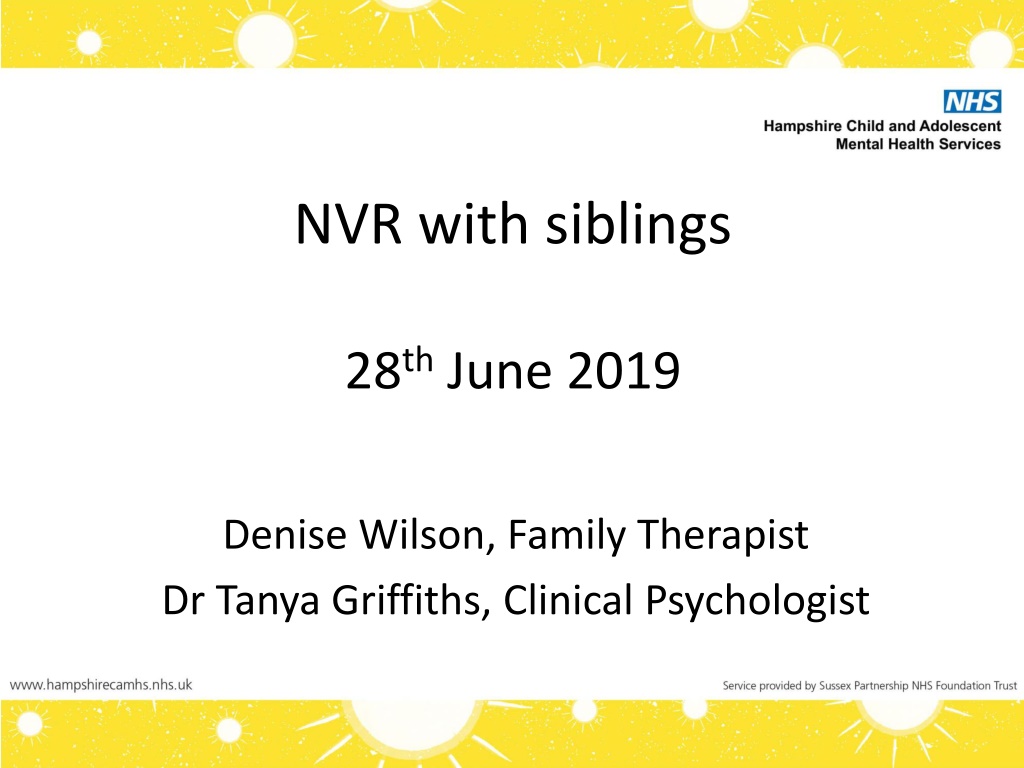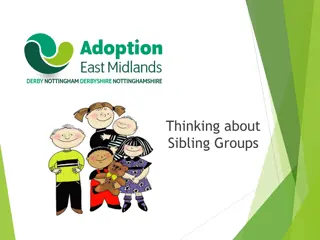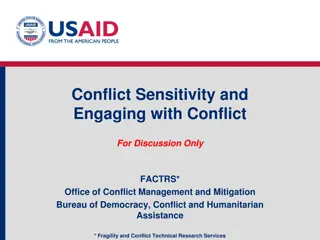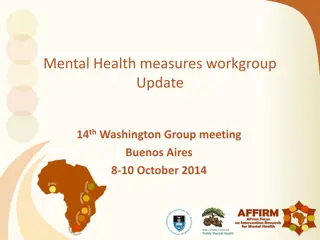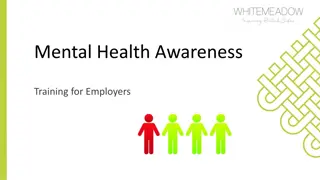Understanding Sibling Conflict and Its Impact on Mental Health
Research highlights the prevalence of sibling conflict, emphasizing its association with negative behaviors in adolescence and adulthood. Addressing sibling aggression and victimization can lead to improved social skills development and better sibling relationships. Recommendations include parental mediation training and support programs integrating sibling conflict awareness to promote a healthier family dynamic.
Download Presentation

Please find below an Image/Link to download the presentation.
The content on the website is provided AS IS for your information and personal use only. It may not be sold, licensed, or shared on other websites without obtaining consent from the author. Download presentation by click this link. If you encounter any issues during the download, it is possible that the publisher has removed the file from their server.
E N D
Presentation Transcript
NVR with siblings 28thJune 2019 Denise Wilson, Family Therapist Dr Tanya Griffiths, Clinical Psychologist
Introductions and Context Who we are Work context Aims for today
Research Background Tucker and Finkelhor(2015) Sibling conflict frequent and mostly mild in nature Approximately 4% report being severely victimised by their sibling Sibling violence occurs more frequently than all other forms of child abuse 11% of 12-year-olds reported being bullied by siblings several times a week
Research Background Sibling conflict and aggression is associated with a variety of internalizing and externalizing behaviours (Tucker et al., 2013) Childhood sibling conflict and aggression is linked to negative adjustment in late adolescence and early adulthood (Bowes et al., 2014) Young people who had been victimized by a sibling only or by both a sibling and parent were more likely to report peer victimization than young people who had been victimized by parents only (Tucker et al., 2014; Glatz et al., 2018) Peer victimization was, in turn, linked to more aggression, criminality, and anxiety (Glatz et al., 2018)
Implications for practice Tucker & Finkelhor (2015) Benefits to delivering social skills and mediation training leading to improved sibling relationship quality and development of children s social skills. Parent training in mediation of sibling conflicts is beneficial for preadolescent children s sibling interactions. Family violence and parenting training programs should incorporate information and support with regard to sibling conflict and aggression.
Research background Ideas drawn from Omer et al. (2008): Raise parental presence Break isolation Notify siblings...and advise they will be protected. Provide list of supporters. Ask the victim for ideas of how they can be better protected. However.... This is not done as part of a group and mainly the work with siblings was via parents.
Research background Dr Alan Cooklin (2013): Impact of Mental Health on Children. Summary: About a million children and young people are significantly affected by parent s mental illness. Children want someone to tell them what s happening, an explanation in straightforward language.
Research background They want someone to talk to, that is not a counsellor. They worry they are going down the same road. They want to meet other children who are in similar situations. They want to know how to help.
Research background Protective Factor If the children have one good relationship with a friendly adult with whom they can discuss what is going on at home, then that itself is protection.
Setting up the group We run 8 to 10 week groups for parents In addition one meeting with friends and family supporters. And one meeting with professionals. Over the course of several groups parents asked could we do a group for the siblings.
Drawing from the Research Reduce Isolation Provide answers to why does my sibling behave like that. Provide strategies for children to help in an NVR way. Consider how supporters can become a protective influence.
What we did Set up group by age of children. Tried to be child friendly ie bean bags Introductions and house keeping Activity Describe your family How brains develop differently
What we did Asked how the sibling s behaviour affects them Identified things to help Asked them to name one thing they liked about their sibling
Themes which emerged Loss of childhood. Disappointments. Unable to confide in parents as they felt they were overwhelmed and their problems seem trivial to those of sibling. Their needs are overlooked. Parentified children. Afraid of sibling. Secondary Trauma. Enjoyed being with other children in similar situations.
What next? Feedback to parents Identifying a supporter Referring on
What next? Who s looking out for siblings? Group exercise What has our work made you think about? What work have you done with siblings with NVR? Feedback
References https://blissfulkids.com/mindfulness-for-children-take-five-exercise Bowes, L. N., Wolke, D., Joinson, C. J., Lereya, T. S., & Lewis, G. (2014). Sibling bullying and risk of depression, anxiety and self- harm: A prospective cohort study. Pediatrics, 134, 1032 39. Cooklin, A. (2013). Promoting children s resilience to parental mental illness: engaging the child s thinking. Advances in psychiatric treatment, 19, 229 240. Glatz, T., K llstr m, ., Hellfeldt, K. et al. (2018). Physical Violence in Family Sub-Systems: Links to Peer Victimization and Long-Term Emotional and Behavioral Problems. Journal of Family Violence. https://doi.org/10.1007/s10896-018-0029-6
References Omer, H., Schorr-Sapir, I., & Weinblatt, U. (2008). Non-violent resistance and violence against siblings. Journal of Family Therapy, 30: 450-464. Siegel, D. (2010). Mindsight: The New Science of Personal Transformation Paperback (Dan Siegel). Bantam: New York Tucker, C. J. and Finkelhor, D. (2015). The State of Interventions for Sibling Conflict and Aggression: A Systematic Review. Trauma, Violence, & Abuse. 18: 4, page(s): 396-406 Downloaded on 20.06.19 from www.scholar.google.com. Tucker, C. J., Finkelhor, D., Turner, H., & Shattuck, A. (2013). Association of sibling aggression with child and adolescent mental health. Pediatrics, 132, 79 84. Tucker, C. J., Finkelhor, D., Turner, H., & Shattuck, A. (2014). Sibling and peer victimization in childhood and adolescence. Child Abuse & Neglect, 38, 1599 1606
